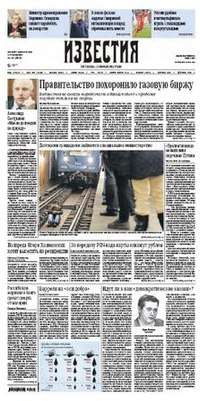Izvestia
Izvestia (Russian: Известия, IPA: [ɪzˈvʲesʲtʲɪjə]) is a daily broadsheet newspaper in Russia. It was a newspaper of record in the Soviet Union from 1917 until the dissolution of the USSR in 1991.[2]
 Front page of the Izvestia newspaper from 15 June 2012. | |
| Type | Daily newspaper |
|---|---|
| Format | Broadsheet |
| Owner(s) | National Media Group |
| Publisher | Inews (News Media) |
| Editor-in-chief | Arseniy Ogenesyan |
| Founded | 13 March 1969 |
| Language | Russian |
| Headquarters | Begovoy District, Moscow, Russia |
| Circulation | 234,500[1] |
| ISSN | 0233-4356 |
| OCLC number | 427395058 |
| Website | iz |
The word izvestiya in Russian means "delivered messages", derived from the verb izveshchat ("to inform", "to notify"). In the context of newspapers it is usually translated as "news" or "reports".
Origin
The newspaper began as the News of the Petrograd Soviet of Workers Deputies on 13 March [O.S. 28 February] 1917 in Petrograd. Initially, the paper expressed Menshevik and Socialist-Revolutionary Party views.
In August 1917, it took the title News of the Central Executive Committee of the Petrograd Soviet of Workers' and Soldiers' Deputies. By October 1917 it became News of the Central Executive Committee of the Soviets of Working and Military Deputies, and was eventually re-titled News of the Soviets of People's Deputies.
After the Second All-Union Congress of Soviets, Izvestia became an official newspaper of the Soviet government (Central Executive Committee of the Supreme Soviet of the Soviet Union and Sovnarkom).
History
1917–1991

During the Soviet period, while Pravda served as the official mouthpiece of the Communist Party, Izvestia expressed the official views of the Soviet government as published by the Presidium of the Supreme Soviet of the USSR.[3] The full name was Izvestiya Sovetov Narodnykh Deputatov SSSR (in Russian, Известия Советов народных депутатов СССР, the Reports of Soviets of Peoples' Deputies of the USSR).
1992–present
Following the dissolution of the Soviet Union, Izvestia now describes itself as a "national" newspaper of Russia. The newspaper was owned by a vast holding company of Vladimir Potanin which had close ties with the government.[4] A controlling stake in Izvestia was purchased by state-owned Gazprom on 3 June 2005, and included in the Gazprom Media holding.[4] According to the allegations of the Committee to Protect Journalists, Raf Shakirov, editor-in-chief of Izvestia, was forced to resign because the government officials did not like the paper's coverage of the Beslan school hostage crisis.[5][6] Other sources informed that Potanin had asked him to leave for fear the Kremlin would be riled by the explicit photographs of the massacre published by Izvestia.[4] As of 2005, the circulation of Izvestia was 240,967. Its 2007 circulation certified by TNS Gallup Media was 371,000 copies.[7] Until his death on 1 October 2008, the chief artist was Boris Yefimov, the centenarian illustrator who had worked as Joseph Stalin's political cartoonist.
In 2008, Gazprom Media sold Izvestia to National Media Group.[8] The newspaper was relaunched in D2 (broadsheet) format after that and adopted a new slogan ("Making Izvestia [i.e., reports] from the news"), as well as extended simultaneously its business coverage. The paper's old business section, Finansovye Izvestia (Finance Izvestia), was closed, and Marker Weekly was launched instead in September 2011, distributed with Izvestia on Mondays. The Friday appendix Nedelya (The Week), devoted to culture and leisure activities, was relaunched as well.
References
- Атлас российской прессы: Газета "Известия" Media Atlas
- "Izvestiia Digital Archive 1917–2010. Online access to the Kremlin's newspaper of record" (PDF). Minneapolis, MN: East View Information Services. p. 5. Retrieved 18 February 2012.
- Andrei G. Richter (1995). "The Russian Press after Perestroika". Canadian Journal of Communication. 20 (1). Retrieved 28 November 2014.
- Bigg, Claire (3 June 2005). "Russia: State-Owned Gazprom Buys Leading Independent Daily 'Izvestiya'". GlobalSecurity. Retrieved 4 September 2007.
- Attacks 2005: Europe and Central Asia. Committee to Protect Journalists. 16 February 2006.
- Russia, Media, Gazprom, Izvestia – JRL 6March 2005 Archived 4 February 2007 at the Wayback Machine
- "Main papers". BBC. 16 May 2008. Retrieved 6 October 2013.
- – About Us National Media Group
Further reading
- Merrill, John C. and Harold A. Fisher. The world's great dailies: profiles of fifty newspapers (1980) pp 170-76
External links
| Wikimedia Commons has media related to Izvestia. |
- Official Izvestia website (in Russian)
- Izvestia on Twitter (in Russian)
- Izvestia on Instagram (in Russian)
- English translations of Izvestia articles at nonprofit WorldMeets.US
- "Izvestia" digital archives in "Newspapers on the web and beyond", the digital resource of the National Library of Russia